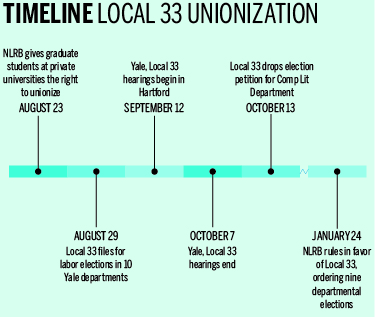
The unrecognized graduate student union Local 33 will hold labor elections in nine departments on Thursday, Feb. 23, according to Yale administrators and union officials.
The nine Local 33 elections will take place in the Dwight Hall common room and Founders Hall on Prospect Street from 9 a.m. to 1 p.m. and 4 p.m. to 6 p.m., Vice President for Communications Eileen O’Connor told the News Thursday. The elections mark the first time in Yale’s history that graduate students will cast legally binding votes on whether to collectively bargain with the University.
Of the nine departments participating in the Local 33 elections, East Asian Languages and Literatures, English, History, History of Art, Political Science and Sociology will vote in Dwight Hall. Math, Physics and Geology and Geophysics will vote in Founders Hall.
In interviews with the News, Yale officials called the election plans — which emerged from discussions between the union, the University and the National Labor Relations Board — undemocratic and overly restrictive. According to O’Connor, Local 33 fought Yale’s requests for an additional day of voting, and originally suggested that all nine elections should take place between 9 a.m. and 1 p.m. at Dwight Hall.
“Unfortunately, union representatives advocated for as short a voting period as possible and limited locations that would greatly inconvenience graduate students in departments closer to Science Hill,” O’Connor said.
In a statement to the News, Local 33 Chairman Aaron Greenberg GRD ’18 did not respond to questions about the poll locations or the additional day of voting. But he noted that Local 33’s original nine election petitions called for the elections to run from 8 a.m. to 8 p.m.
“We petitioned for 8 a.m. [to] 8 p.m. voting hours,” Greenberg said. “The NLRB made it clear to us that they would make the decisions about the logistics of the election.”
Still, Graduate School Dean Lynn Cooley said she was disappointed by Local 33’s efforts to restrict the number of voting areas and that she would have preferred for the union to adopt a more inclusive approach.
Yale’s reaction to Local 33’s election dates represents the latest chapter in a bitter and divisive legal battle that began in August, when the union filed for elections in 10 individual departments. The University contested the union’s approach in legal court, and Local 33 later withdrew its petition for an election in the Comparative Literature Department.
But on Jan. 24, NLRB Regional Director John Walsh ruled that the departmental elections should go forward, citing a controversial labor board decision from 2011 that paved the way for so-called micro-units to hold union votes. Yale is considering appealing Walsh’s ruling to the national labor board in Washington.
On Twitter on Wednesday night, Local 33 posted a celebratory image of balloons flying from a voting booth, under the caption, “We have our election date!”
Camille Cole GRD ’20, a graduate student in the History Department, pointed out that Yale has opposed Local 33’s organizing efforts at every stage of the process.
“Yale didn’t like our idea of working together to come up with a process. Now they don’t like the NLRB’s election process,” Cole said. It’s starting to feel like there’s no pleasing them.
Still, over the course of the year, Local 33 has faced significant pushback from graduate students skeptical of the departmental election strategy. In October, the Graduate Student Assembly voted to oppose Local 33, breaking years of silence on the unionization issue.
Stephen Albright GRD ’19, a GSA representative for the Physics Department, said the debate between Yale and Local 33 over election logistics was typical of the union’s organizing tactics.
“The positions the University and Local 33 took on unionization elections speak to their priorities: Yale values the interests and voices of all graduate students, while Local 33 values the interests and voices of pro-union graduate students over everyone else,” Albright said. “The only reason I can see for requesting a four-hour, single location election is to make it as difficult as possible for dissenting, but disengaged, graduate students to vote.”
And in an interview on Thursday, outspoken Local 33 opponent Elizabeth Mo GRD ’18 noted that the schoolwide union elections at Harvard and Columbia — both of which took place last fall — lasted two days each, with polls closing at 8 p.m.
GSA Chairman Nicholas Vincent GRD ’17 echoed that complaint, but acknowledged that significantly more students were eligible to vote in the elections at Harvard and Columbia.
“The hours do seem a little bit limited,” Vincent said. “Still, there are only approximately 300 students who are eligible to vote. I hope that if they feel strongly either way, they’re able to make it to their appropriate polling places during the times.”
In 2003, the Graduate Employees and Students Organization, a precursor to Local 33 that was founded in the early 1990s, held an unofficial schoolwide labor election and narrowly lost. At the time, GESO was criticized for providing only one polling location — inside Dwight Hall — making it difficult for students taking classes on Science Hill to participate.
But this month’s departmental elections are different: Unlike in 2003, the results will be legally binding, meaning that Yale will be obligated to negotiate a contract with the union if the elections are successful, and only students who are currently teaching in the nine departments will be eligible to vote. That group includes Ph.D. students based in those departments, Ph.D. students based in other departments and master’s and professional students.
Kevin Swain contributed reporting.







